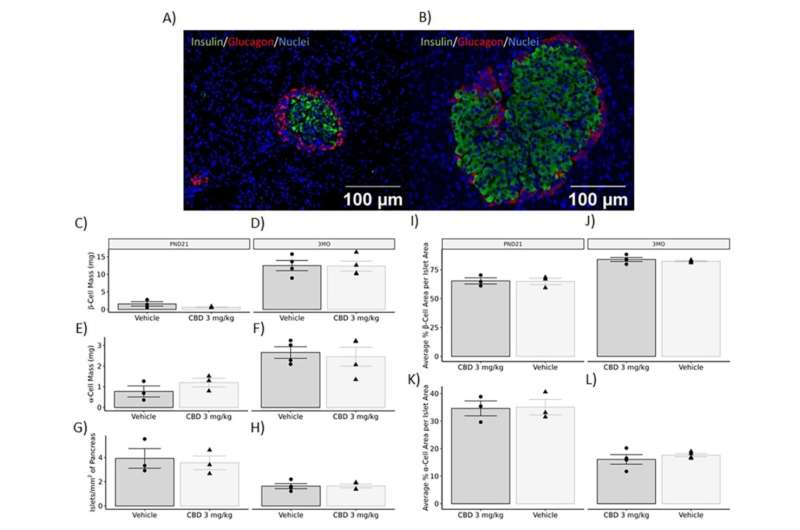This article has been reviewed according to Science X's editorial process and policies. Editors have highlighted the following attributes while ensuring the content's credibility:
fact-checked
peer-reviewed publication
trusted source
proofread
Research suggests prenatal exposure to cannabis increases diabetes risk in offspring

Cannabis consumption is prevalent among pregnant women in North America, particularly those between the ages of 18 and 24 years, previous research has shown. They report using it for various reasons, including alleviating nausea, body aches and anxiety related to pregnancy.
While existing clinical data points to negative effects like fetal growth restriction and abnormal blood sugar levels in children born to mothers who used cannabis, the impact of the non-psychoactive compound of cannabis, cannabidiol (commonly known as CBD), on metabolic outcomes of the offspring remains less understood.
A new study in animal models, led by Ph.D. candidate Sebastian R. Vanin, under the supervision of Western professor Daniel B. Hardy, has shown that even moderate exposure to CBD during pregnancy is linked to post-birth glucose intolerance specifically in male offspring.
"This is a critical finding, given that CBD, unlike cannabis' psychoactive compound, tetrahydrocannabinol or THC, is widely marketed and perceived to be a safer option by so many," said Hardy, associate professor in the departments of obstetrics & gynecology and physiology & pharmacology at the Schulich School of Medicine & Dentistry.
While it is THC that leads to the "high" effect cannabis users experience, CBD is the primary non-psychoactive compound in cannabis and is also medicinally used for the treatment of certain forms of epilepsy, schizophrenia, and depression.
"Our study shows that exposure to CBD alone during pregnancy can be detrimental to the metabolic health of the offspring later in life, leading to glucose intolerance. This is a major risk factor for diabetes," said Hardy, who is also a scientist in the division of maternal, fetal and newborn health at Children's Health Research Institute.
The study, published in the Journal of Endocrinology, shows that while CBD exposure did not lead to adverse maternal or neonatal outcomes in the rodent model, by three months of age male offspring exposed to CBD during gestation exhibited glucose intolerance.
A previous study from the Hardy lab showed that prenatal exposure to THC, the main psychoactive component of cannabis, in rat model led to glucose intolerance and insulin resistance in female offspring.
"With the latest study, we now know that gestational exposure to either cannabinoid—THC and CBD—can lead to glucose intolerance in the offspring. However, THC exposure impacts the glucose tolerance of female offspring while CBD exposure impacts the male offspring," said Vanin.
The male offspring that were exposed to CBD exhibited changes in their genes that control body clocks, particularly the circadian rhythm clock. This can adversely impact how our bodies regulate sugar or glucose. Males also exhibited changes in how their livers develop and function, which suggests that being exposed to CBD while in the womb could harm liver development and health throughout the course of life.
"After legalization of cannabis in Canada and the subsequent increase in its use, there's a lot of focus on how cannabis impacts the brain, especially the developing brain. We are also interested in studying how cannabis exposure during pregnancy influences the development of other metabolic organs including the pancreas, liver, and heart," said Hardy.
The Hardy lab studies how impaired fetal development can predispose offspring to metabolic deficits in adulthood.
"Pre-natal exposure to cannabis can also occur through fathers, so we are currently interested in studying how that impacts fetal growth and development as well."
More information: Sebastian R Vanin et al, Gestational exposure to cannabidiol leads to glucose intolerance in 3-month-old male offspring, Journal of Endocrinology (2023). DOI: 10.1530/JOE-23-0173





















